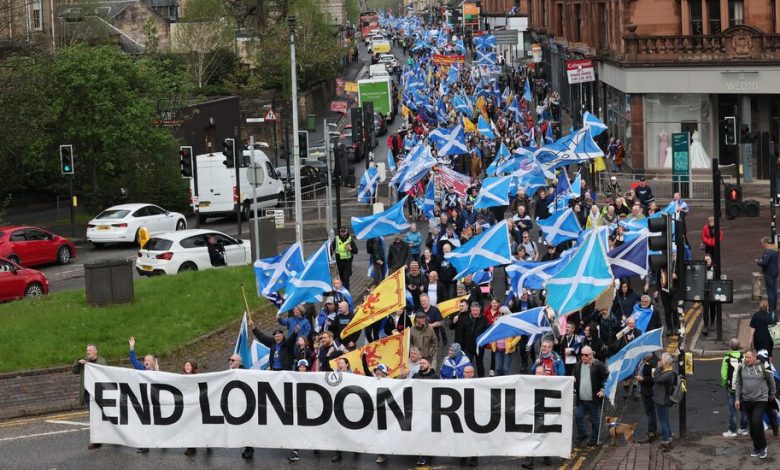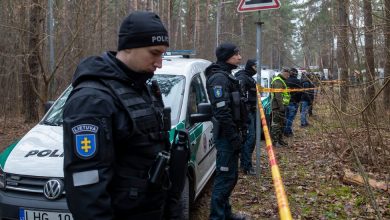Scotland’s Independence Movement Is Down, but Not Out, Analysts Say

For almost a decade Nicola Sturgeon, as the leader of the Scottish government, was the uncontested figurehead of the push to break Scotland’s centuries-old union with England.
Her resignation earlier this year — and now her arrest on Sunday over an investigation into her Scottish National Party’s finances — leaves the fate of the movement in flux.
Support for independence has dipped, but backing for Scotland remaining part of the United Kingdom, a bond forged in 1707, is fragile, too. Opinion polls show the Scottish public still roughly split on the issue. For now, the political path to an independent Scotland is blocked.
“It’s a stalemate, there is no settled will for independence, but equally we have to acknowledge that there is no settled will for union either,” said Nicola McEwen, professor of territorial politics at the University of Edinburgh.
“Reports of the demise of the independence movement and indeed of the S.N.P. are somewhat exaggerated,” said Professor McEwen, who added that “given everything that’s going on, maybe it’s surprising that support hasn’t declined more than it has.”
Operation Branchform, the code name for inquiry into the Scottish National Party’s finances, began in 2021 and was reported to have followed complaints about the handling of about 600,000 pounds, or about $750,000, in donations raised to campaign for a second vote on Scottish independence. In 2014, Scots voted by 55 to 45 percent against breaking away from the United Kingdom in a divisive referendum.
Ms. Sturgeon, who was released on Sunday after seven hours of questioning and who swiftly proclaimed her innocence, has not been charged. On Monday, her successor, Humza Yousaf, rejected calls for Ms. Sturgeon to be suspended from the party.
She is the third senior figure in the party to be arrested but not charged. Another is Ms. Sturgeon’s husband, Peter Murrell, the party’s former chief executive who held the post from 1999 until March, when he resigned after accepting blame for misleading statements from the party about the size of its dues-paying membership.
The police investigation deepened in the weeks after Ms. Sturgeon’s surprise resignation and the fractious competition to succeed her that was won, narrowly, by Mr. Yousaf.
His leadership is still relatively new but, so far, he has struggled to match the high profile of his predecessor, or to advance toward the prize that ultimately eluded her: Scottish independence.
Supporters have pressed for a second vote on Scottish independence after the first one failed in 2014. Their argument was bolstered by Brexit, which took Britain out of the European Union because the majority of Scots who voted in the Brexit referendum of 2016 wanted to remain in the European bloc. They were outnumbered by voters in England and Wales who wanted to leave.
But, to have legal force, the government in London must agree to another vote on independence, and successive prime ministers have refused, insisting that the decision of 2014 stands for a generation.
Ms. Sturgeon hit another roadblock last year when she tested in court her right to schedule a referendum without approval from London. In November, Britain’s Supreme Court ruled against her.
Some hard-line voices favor unilateral action, perhaps holding a vote in defiance of London. Catalan separatists in Spain took that route in 2017, but it led to the imprisonment or exile of some independence movement leaders. And going outside the law would block an independent Scotland’s path toward membership of the European Union, the S.N.P.’s objective.
Frustrated on all sides, Ms. Sturgeon finally proposed using the next British general election, which is expected in the second half 2024, as a de facto independence referendum, making Scotland’s constitutional future the central question. Internal critics doubted the practicality of that idea, given that other political parties would not agree.
In an interview broadcast on Sunday, before Ms. Sturgeon’s arrest, Mr. Yousaf said he was confident that, even with recent setbacks, an independent Scotland was coming.
“Despite having some of the most difficult weeks our party has probably faced, certainly in the modern era, that support for independence is still rock solid. It’s a good base for us to build on,” he told the BBC. “I’ve got no doubt at all, that I will be the leader that will ensure that Scotland becomes an independent nation.”
The party might have missed its moment, however. It is hard to see a more favorable backdrop for the independence campaign than the messy aftermath of Brexit, the chaotic leadership of the former prime minister, Boris Johnson — who was unpopular in Scotland — and the political dramas of 2022 when Britain changed prime ministers twice.
Paradoxically, while Brexit may have strengthened the political case for Scottish independence, it has complicated the practical one. Britain has left the European Union’s giant single market and customs union, and that implies that there would be a trade border between an independent Scotland and England, its biggest economic partner.
The years of gridlock and chaos that followed the Brexit referendum may also have scared some Scottish voters away from further constitutional changes.
In addition, the S.N.P. has been criticized over its record in government, and the opposition Labour Party senses an opportunity to recover in Scotland, where it dominated politically before the S.N.P. decimated it.
“Coming after dishonest claims of party membership, a very poor record in government and making no progress on independence this simply adds to the S.N.P.’s woes,” said James Mitchell, a professor of public policy at Edinburgh University, referring to recent events.
“It would be damaging enough to the S.N.P.’s electoral prospects but with Labour looking ever more confident and competent in Scotland as well across Britain, it looks as if the S.N.P.’s opportunity to advance its cause has passed.”
The next British general election might present Mr. Yousaf with a new opening if, as some pollsters predict, Labour emerges as the biggest party but without an overall majority. In that scenario, the S.N.P. could try to trade its support for a minority Labour government in exchange for a promise to hold a second referendum.
The problem is that Keir Starmer, the Labour leader, has so far rejected any such deal. And, if some Scottish independence supporters vote for Labour to try and defeat the Conservative government, led by Rishi Sunak, the S.N.P. could lose seats at Britain’s Parliament, weakening its hand.
Some analysts believe that the independence movement should concentrate on building wider popular support, including through other organizations and political parties, reaching out beyond the confines of the S.N.P. and its supporters.
After all, Scotland’s union with England was entered into voluntarily, andwere opinion polls to show around 60 percent of voters consistently favoring an independent Scotland, that would be difficult for a British government to ignore.
Even Mr. Yousaf acknowledges that is some way off, however. At present, he told the BBC, “it’s pretty obvious that independence is not the consistent settled will of the Scottish people.”
The question confronting him, his colleagues and the wider independence movement is how they intend to change that. “I don’t really see any signs of a strategy,” said Professor McEwen, “that doesn’t mean there isn’t one, I just don’t see any evidence of it.”




